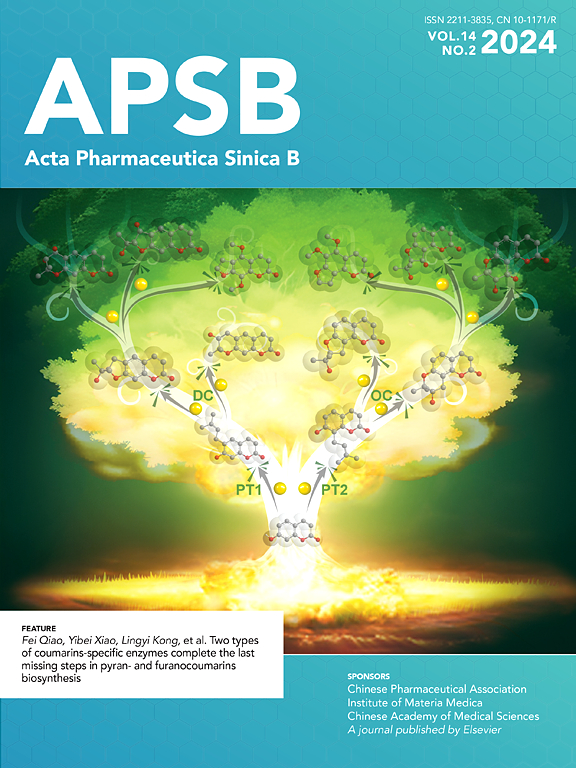去泛素酶USP13通过促进自噬介导的STING降解来减轻阿霉素诱导的心脏毒性
IF 14.7
1区 医学
Q1 PHARMACOLOGY & PHARMACY
引用次数: 0
摘要
阿霉素是一种广泛应用于各种恶性肿瘤的蒽环类药物。但Dox致死性心脏毒性限制了其临床应用。心肌细胞中泛素化/去泛素化的转录后蛋白修饰介导dox诱导的心脏毒性(DIC)的病理生理过程。在这项研究中,我们旨在阐明去泛素化酶,泛素特异性肽酶13 (USP13)在DIC中的调节作用和机制。RNA-seq分析和实验检查发现心肌细胞来源的USP13与DIC呈正相关。心脏特异性缺失USP13的小鼠采用Dox模型。构建了携带cTNT启动子的腺相关病毒血清型9 (AAV9)在小鼠心脏组织中过表达USP13。心肌细胞特异性敲除USP13加重了DIC,而其过表达减轻了小鼠的DIC。在机制上,USP13去泛素化干扰素基因刺激因子(STING)并促进STING的自溶酶体相关降解,从而减轻心肌细胞炎症和死亡。我们的研究表明,USP13在DIC中具有心脏保护作用,并表明USP13是DIC治疗的潜在治疗靶点。本文章由计算机程序翻译,如有差异,请以英文原文为准。

Deubiquitinase USP13 alleviates doxorubicin-induced cardiotoxicity through promoting the autophagy-mediated degradation of STING
Doxorubicin (Dox) is an anthracycline drug widely applied in various malignancies. However, the fatal cardiotoxicity induced by Dox limits its clinical application. Post-transcriptional protein modification via ubiquitination/deubiquitination in cardiomyocytes mediates the pathophysiological process in Dox-induced cardiotoxicity (DIC). In this study, we aimed to clarify the regulatory role and mechanism of a deubiquitinating enzyme, ubiquitin-specific peptidase 13 (USP13), in DIC. RNA-seq analysis and experimental examinations identified that cardiomyocyte-derived USP13 positively correlated with DIC. Mice with cardiac-specific deletion of USP13 were subjected to Dox modeling. Adeno-associated virus serotype 9 (AAV9) carrying cTNT promoter was constructed to overexpress USP13 in mouse heart tissues. Cardiomyocyte-specific knockout of USP13 exacerbated DIC, while its overexpression mitigated DIC in mice. Mechanistically, USP13 deubiquitinates the stimulator of interferon genes (STING) and promotes the autolysosome-related degradation of STING, subsequently alleviating cardiomyocyte inflammation and death. Our study suggests that USP13 serves a cardioprotective role in DIC and indicates USP13 as a potential therapeutic target for DIC treatment.
求助全文
通过发布文献求助,成功后即可免费获取论文全文。
去求助
来源期刊

Acta Pharmaceutica Sinica. B
Pharmacology, Toxicology and Pharmaceutics-General Pharmacology, Toxicology and Pharmaceutics
CiteScore
22.40
自引率
5.50%
发文量
1051
审稿时长
19 weeks
期刊介绍:
The Journal of the Institute of Materia Medica, Chinese Academy of Medical Sciences, and the Chinese Pharmaceutical Association oversees the peer review process for Acta Pharmaceutica Sinica. B (APSB).
Published monthly in English, APSB is dedicated to disseminating significant original research articles, rapid communications, and high-quality reviews that highlight recent advances across various pharmaceutical sciences domains. These encompass pharmacology, pharmaceutics, medicinal chemistry, natural products, pharmacognosy, pharmaceutical analysis, and pharmacokinetics.
A part of the Acta Pharmaceutica Sinica series, established in 1953 and indexed in prominent databases like Chemical Abstracts, Index Medicus, SciFinder Scholar, Biological Abstracts, International Pharmaceutical Abstracts, Cambridge Scientific Abstracts, and Current Bibliography on Science and Technology, APSB is sponsored by the Institute of Materia Medica, Chinese Academy of Medical Sciences, and the Chinese Pharmaceutical Association. Its production and hosting are facilitated by Elsevier B.V. This collaborative effort ensures APSB's commitment to delivering valuable contributions to the pharmaceutical sciences community.
 求助内容:
求助内容: 应助结果提醒方式:
应助结果提醒方式:


